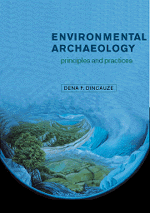18 - ANTHROPOCENTRIC PALEOECOLOGY
Published online by Cambridge University Press: 20 January 2010
Summary
In all scientific endeavour, the relationships and communications between allied disciplines are of paramount importance; if we define archaeology quite broadly as the application of all man's current knowledge and techniques to the study of all man's past knowledge and techniques, then archaeologists are compelled more than any profession to communicate with their disciplinary neighbours.
BODDINGTON ET AL. 1987: 3In the first sentence of Chapter 1, we quoted Hardesty (1977: 290) defining ecology as “that branch of science concerned with [the study of] the relationships between organisms and their environment.” In Part VI, we introduced “neoecology” as a special aspect of ecology devoted to the study of living species in their environments or in laboratory situations, and “paleoecology” as the application of principles from neoecology along with disciplined inference to the study of organisms in environments no longer directly observable. On the basis of these definitions, paleoecology is the best that archaeologists can do in researching societies of the past. Furthermore, because archaeologists are particularly devoted to the ecology of human beings, our study is necessarily anthropocentric. This volume is an extended argument for the centrality to archaeology of an anthropocentric paleoecology; the concept imposes on research and interpretation broader contexts and goals than are typically included in the currently controversial term “environmental archaeology”.
The argument that humanbeings can exist and act independently of their environments is a fallacy deeply rooted in Western culture (Glacken 1967). The false dichotomization of nature and culture is supported by religious and technological ideologies, and embraced by development economics. The environmental crises of today are direct results of such dismissal of interactive mutualities between organisms and their physical and social environments.
- Type
- Chapter
- Information
- Environmental ArchaeologyPrinciples and Practice, pp. 497 - 522Publisher: Cambridge University PressPrint publication year: 2000



